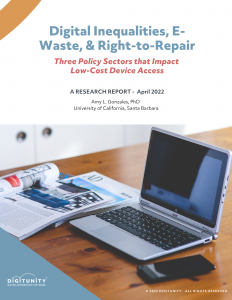
Digital inequalities, e-Waste, and Right-to-Repair are three policy sectors informing device access.
How can government policy handle computer ownership?
Though the government has long played a key role in promoting internet and computing access, a review of U.S. and international legislation reveals an emphasis on internet access over other factors necessary for holistic digital connectedness, such as device access and digital skills training.
Digitunity commissioned leading expert Amy Gonzales, an Associate Professor of the Department of Communication at the University of California, Santa Barbara, to highlight government legislation from around the globe that primarily informs personal ownership of computing devices.
This original report provides information to identify policies that practitioners, researchers, policy makers, and other digital opportunity practitioners might target to optimize computer access over the coming decades. Register below. Then, click the download button to receive a PDF copy of the report.
Download the Digital Inequalities, E-Waste, & Right-to Repair Report



